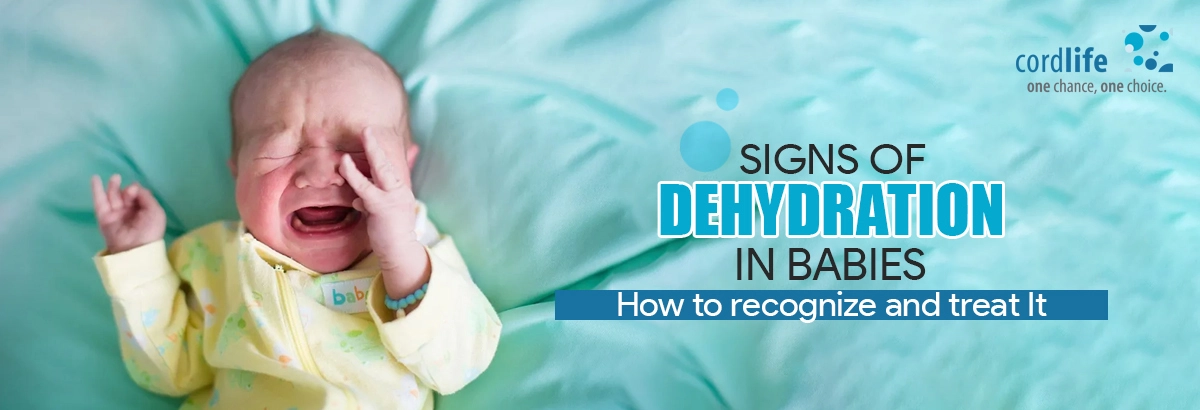Table of Contents
Once you hold your little one after waiting for nine long months, you’d expect your baby to be born and live healthily. A slight change in your baby’s health – maybe skin rashes, diarrhoea, etc., would be irritable for them and you.
Your newborn baby’s dehydration is one such problem. Dehydration in babies is when they’ve lost too much water through sweat, pee, poop, crying, a low breastmilk supply, the newborn not latching properly, etc. Overall, the little one is losing out on a lot of fluid, and salt from the body, and cannot take in more.
So, as new parents, how can you recognise dehydration signs and how can you treat it?
How Will You Recognise Dehydration in Baby?
Since your baby’s only way of communication with you is through their crying, you’ll most likely look for signs of dehydration by seeing whether:
There are Fewer Wet Diapers
You can expect your newborn to wet their diapers at least four to six times a day. If your newborn urinates less than you expect – perhaps urinating less or not passing urine at all in 4 to 6 hours or 6 to 8 hours in a day – they might be dehydrated. Along with fewer wet diapers, you also need to find out whether urine is dark, smelly, or concentrated.
Thirsty Feeling
Usually, he/ she drinks lots of water and passes urine enough. But, maybe due to a stomach infection, diarrhoea, and vomiting, a lot of fluid goes out of the little one’s body, making him or her thirsty. Therefore, parched lips and a dried mouth, tongue, and throat are dehydration symptoms.
Fatigue and Irritability
If you notice your baby being drowsy, fussy, or unusually tired, these could be signs of dehydration. Lack of energy and increased irritability may also be indicators. In severe cases, a dehydrated baby may refuse water.
Sunken Eyes
Since your little one is dehydrated and trying to adjust, dark circles may appear under the eyes. You’ll notice that those sweet baby eyes have turned pale, tears are absent, and they appear sunken.
Changes in Breathing Patterns
Since your baby’s lips and mouth are feeling dry, tired, exhausted, and out of energy, there are chances that you notice changes in their breathing pattern. Your baby has a faster heart rate than usual.
If you notice these signs in your little one, it’s essential that you either take the child to the healthcare practitioner, to treat them medically or with natural remedies.
How to Stop Dehydration in Babies?
The signs of dehydration and the side effects are significant health factors for your newborn that you ought to feel concerned about. As a new mommy, you remember that your little one requires more nutrition and calories during this time, to at least 6 months. Drinking water may dilute calorie intake. So, here are a few that you need to do to stop dehydration in your babies:
Breastfeed or Formula Feed More Than Usual
Breastfeeding enhances the bond between you and the newborn. So, you must nourish your newborn 8 to 12 times a day for at least a month. If your newborn is not latching properly, and showing signs of dehydration, increase the number of times you feed your little one. Try to feed the dehydrated newborn at regular intervals – after every 1 to 2 hours. You’re formula feeding, give the milk by bottle, spoon, or cup. You can also gently feed the baby with a sterile dropper.
Make Your Newborn Wear Light, Cotton and Breathable Clothing
Since dehydration in babies includes diarrhoea, vomiting, sweating (especially at night), fever, etc., they dress in light, breathable, comfortable, cotton fabric.
Shade Your Little One Under the Sun
Since heat and sweat are some of the causes of dehydration, be cautious while you go outside with your baby. If your little one is going out with you and is exposed to the sun (maybe on a sweaty summer day) ensure that you stand in the shade whenever possible. Alternatively, you can keep your baby safe from the sun by lathering his skin with sunscreen and a wide-brimmed hat.
Give a Sponge Bath to Your Feverish Baby
Fever is one of the side effects of dehydration. So, if you notice a high temperature in your baby, you need to give a sponge bath in lukewarm water. This will naturally lower the fever.
Give Your Fussy Baby Juicy Food
Since you can’t give water to your newborn, medically feed them juicy fruits like watermelon, plums, or cucumbers. Don’t forget to mash the fruits before feeding the little one.
Dehydration is common among babies. Address the problem carefully, by watching the signs and symptoms. For serious cases, your child needs medical attention.
